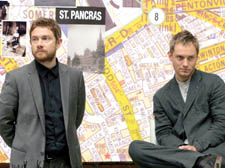|
|
 |
| |
Minghella’s broken world
BREAKING AND ENTERING
Directed by Anthony Minghella
Certificate 15
DIRECTOR Anthony Minghella is making a clear political point with his latest film, Breaking and Entering. He wants to show how a tough world can be made a little softer with some understanding.
He also makes a valid comment on the nature of crime and justice – like an updated version of 12 Angry Men.
And Minghella has a great cast to work with. Although Jude Law’s character Will has the most screen time, Robin Wright Penn is superb as Liv, his dysfunctional, confused and depressed wife.
She is pained and troubled and tousled and one minute unpleasant and the next a shining light. Her complexities are played out in the ridges across her brow, her twiddling with her daughter’s hair as she wonders whether life will always be as gloomy as it feels that day.
The story of two teenagers are the back plots of this film. They are both experiencing some major growing pains.
The strange world of Oanan – she won’t have anything to do with the colour yellow, even down to the stitching on her towel, is obsessed with doing gymnastics at the Talacre Sports Centre, collects batteries as a hobby – offers a disturbing background to Will’s otherwise manicured life.
He has the car, the suits, is a partner in a swanky business with a contract to play a major role in the biggest redevelopment London has seen since the end of World War II. But while life should be good for the architect, his world is full of problems, full of difficulties.
And the other teenager we meet is one of his worries. Miro (Rafi Gavron) is being used by his uncle’s band of thieves. His obsession with free running – the urban craze of doing dangerous acrobatic stunts, makes him the perfect cat burglar.
He spends his nights shinning up drainpipes and in through skylights.
And when his firm, Green Effect, is burgled not once but twice, Will and Sandy (a polished performance by the bearded Martin Freeman of The Office fame) decide to spend a couple of nights camped out in their car to try and catch the perpetrators at it again.
And their wait is not fruitless. Will spots Miro as he attempts another break-in and gives chase.
Miro leads him to his home, and it is here that Will begins to find out a little more about the boy who has been stealing his computers.
Miro’s mother Amira (Juliet Binoche) has the air of the oppressed about her. We learn she fled from Bosnia with her young son during the siege of Sarajevo. But they had to live her husband behind.
“He was an engineer,” she explains to her boy. “He had to stay. He was needed.”
And this has affected the boy – and gives Will a greater incentive to care a little more and condemn a little less.
It is a sweet film, well shot, an important topic, and, above all, enjoyable. Minghella makes you care about the characters.
And he is making a statement that is not often heard – that we have a responsibility towards each other, and restitution is as important as recrimination.
The problem Jude Law faces is he is so recognisable, and subconsciously it detracts from his ability to get into a role.
For the viewer the film is full of well-known Camden landmarks, and it means when the action dulls a little, your mind can wander for a moment playing spot the street.
But overall, with the constant barrage of news on anti-social behaviour, the creaking criminal justice system, this is a timely film.
|
 |
| |
|
 |
|

